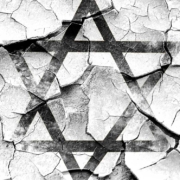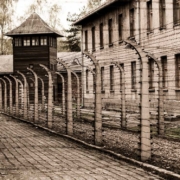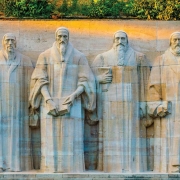It is an accusation as old as Christianity itself: “The Jews killed Jesus.” Throughout the centuries, many self-proclaimed Christians have joined or led the fight against the Jewish people, charging them with deicide—the murder of God. In their eyes, this unforgivable crime committed by Jews of antiquity demonstrates the inherent wickedness of the entire race, leaving them and their descendants forever cursed as “Christ-killers.” In today’s increasingly anti-Jewish climate, a growing number of believers are once again espousing this allegation, claiming that the Bible undeniably testifies that the Jews are responsible for Yeshua’s death. But Scripture doesn’t actually support this teaching… does it?
Read moreIn this series, we have traced Protestant anti-Jewish sentiments from their source at the Reformation down through the centuries, exploring the damage they have caused. This concluding article examines how these same beliefs still manifest today, and how we as followers of Messiah must take action to heal the ancient wounds of anti-Jewish sentiment.
Read moreAs we saw in the first two parts of this series, the anti-Jewish and anti-Semitic teachings of Protestantism began with the Reformers of the 1500s, and continued to grow and develop in the centuries that followed. Then, during the twentieth century, the anti-Semitism of previous generations came to a head, showing itself fully at the zenith of Jewish persecution: the Holocaust.
Read moreIn the previous article in this series, we briefly discussed the anti-Jewish history of Ancient Christianity and Catholicism, and then looked at the abhorrent anti-Semitism of Martin Luther, the first Protestant Reformer. Had Luther been the only anti-Jewish Protestant, little concern would be warranted; however, Luther was merely the first of many.
Read moreSince biblical times, discord between Jews and Gentiles has plagued the Body of Messiah. In his letter to the Romans, Paul wrote extensively on the issue, humbling Jews by telling them that they are not better than Gentiles (3:9), and humbling Gentiles by telling them to not boast over Jews (11:17–21). Gentiles are not even to boast over unbelieving Jews, Paul explained, because “regarding the chosenness, [Jews] are beloved on account of the fathers,” called with an irrevocable call which God will not regret (11:28-29, mjlt). Indeed, though many Jews today reject their Messiah, they can still “be grafted [back] into their own olive tree,” and one day “all Yis’rael will be saved” (11:24–26, mjlt).
Despite Paul’s teaching, however, the same division has grown, such that both anti-Semitism (racist contempt for Jews) and anti-Jewish sentiment (intellectual or theological bias against Jews) have continued to pervade Christianity throughout its history.
Read moreWith the recent war in Israel, the clash between Arabs and Jews in the region is once again a hot button issue. While many onlookers on both sides continue to rail against one another, this time, the conflict has also spilled over into cities around the world, with anti-Semitic rhetoric and violence ticking up to even more dangerous levels than before. Given the abundance of misinformation, false accusations and questions surrounding this explosive topic, here are some facts about the tumultuous history of the holy land, and how this recent bout between Israel and the Palestinians got started.
Since the latter half of the 20th century, the world has seen a steady decline in anti-Semitism… or so many of us thought. But for those who have been paying attention—who have never taken their eyes off of God’s treasured people Israel—we have seen anti-Semitism continue and even thrive in many forms. Today, we are beginning to see anti-Semitism in what we previously thought were impossible places—and it is only getting worse.
Anti-Semitism is an ancient hatred of the Jewish people that can trace its roots back through Israel’s history, as recorded in the Scriptures. With alarming reports of anti-Semitism on the rise throughout the world, it is worthwhile to consider its origins, and how we can best overcome its effects.
A Hated Nation
In the beginning, Israel was welcomed into Egypt as a mere tribe of seventy souls (see Exodus 1:5), but within a generation, the people multiplied to such an extent that the king of Egypt grew concerned with their numbers and enslaved them. They were worked ruthlessly, their lives made bitter with hard labor, and their newborn sons decreed to be killed (see Exodus 1:13-16). In this, the Scriptures say that the Egyptians were “in dread” or “loathing” of the people of Israel (see Exodus 1:12).
Passover is the season in which Jewish people all over the world remember how God supernaturally and powerfully set our nation free. But now that this year’s joyful celebration has come and gone, I am feeling somewhat melancholy about it. With as much gratitude that Passover stirs in me for Adonai’s everlasting faithfulness and truth, I find my current emotional state considerably tempered by the sobering signs of the times.
Recently, a supporter of the ministry sent me a link to a five-and-a-half-minute video entitled “The Jewish Voices on Campus,” which depicts “a message of hate bred on the tongues of terrorists” that is “now poison[ing] our college campuses today.” As one Jewish student in the video puts it, “Being against Israel has become the ‘cool’ thing to do.” In other words, American college campuses are seeing a sharp and serious rise in anti-Semitic (Jew-hating) rhetoric and behavior, and it is being seen as normal and “cool.” The grossly negative world-sentiment concerning the modern State of Israel has infected the hearts and minds of teenagers—the future leaders and decision-makers of our nation.
a Perfect Word Ministry










